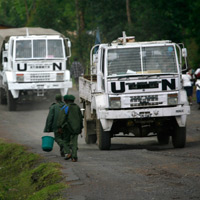
Current Situation
Between 1996 and 2002, the two massive wars fought in the Democratic Republic of the Congo were arguably the world’s deadliest since World War II. With almost no international fanfare, Congo is on the brink of its third major war in the last decade, and almost nothing is being done to stop it.
A dissident Congolese Tutsi General named Laurent Nkunda and at least 3,000 loyal forces have carved out control of parts of North
Kivu Province. The Congolese government has responded by realigning itself with the FDLR—a militia composed of more than 6,000 Rwandan Hutu rebels, many with links to the 1994 genocide in their home country—to fight Nkunda’s more effective force.
Fighting between the two sides has intensified in recent weeks. Troops are being deployed to the front line and more are being forcibly recruited, and the potential for Rwanda to be drawn back
into Congo—as it was in the two previous wars—increases with each day the international community drags its feet.
If the international community does not press the Congolese government to work toward a diplomatic solution, supported by a series of carrots and sticks, the situation will continue to deteriorate and further destabilize the Great Lakes Region.
Key Players and Acronyms
The Congolese government—Newly elected President Joseph Kabila faces the daunting task of providing security to eastern Congo as armed groups, competing for rich natural resources, fill the
void left by a chronically weak Congolese state. The ineffective and abusive Congolese Army aligns itself because it is too weak to fight Nkunda on its own.
FDLR (Democratic Liberation Forces of Rwanda)—The FDLR live amongst the Congolese population in North and South Kivu provinces, where they commit severe human rights abuses and threaten the fragile relationship between Congo and Rwanda.
Laurent Nkunda—Nkunda rejects orders from Kinshasa to join the national army so that he can “protect” the local Tutsi population from the FDLR. In the process, his forces commit grave human rights abuses against civilians, which reinforce anti-Tutsi and anti-Rwandan sentiments in the region.
United Nations Mission in Congo (MONUC)—The world’s largest peacekeeping operation, with a budget of over one billion dollars, MONUC’s mission is to protect civilian populations and support the newly elected Congolese government in its efforts to improve security. MONUC can support peacemaking efforts, but only if President Kabila abandons a military solution and focuses on a diplomatic one.
The United States—The grassroots movement for peace in the Congo is small in comparison to that of Darfur and even northern Uganda. However, strong pressure from U.S. citizens could do much to move Congo up the foreign policy agenda and avert a catastrophic return to war.
Rwanda—Strong evidence suggests that Rwanda, which has invaded neighboring Congo twice in the last 10 years, is supporting Nkunda. Specifically, Rwandan officials turn a blind eye to Nkunda’s forced recruitment of fighters, sometimes children, inside Rwanda. The Congolese army’s alliance with the FDLR increases the FDLR’s threat to Rwanda, and could plunge the region back into conflict.
DDR—Disarmament, demobilization, and reintegration of combatants to help turn former fighters into productive members of society.
SSR—Security Sector Reform is restructuring and training the military and police to more effectively secure the country.
Policy Challenges and Isues
The lawlessness that permeates Congolese society makes its resource-rich regions prone to conflict and instability. Fighting in eastern Congo will continue to escalate absent international pressure on the key players. The inability of the Congolese armed forces to provide security has led to the creation of a host of militias that promise to do so. These groups are supported by a range of actors, from governments to diaspora populations, and attempts to demobilize them have been and will continue to be difficult. Meanwhile, casualties continue to mount and the eastern Congo maintains one of the world’s highest death rates.
The Policy Response Enough’s 3Ps
Peacemaking MONUC must enlist international support for a diplomatic initiative to negotiate an integration of Nkunda’s forces into the Congolese army and demobilize willing FDLR forces.
Protection Maintain current UN troop deployments while increasing financial and technical assistance to reform Congo’s military forces and devise a credible military strategy for the FDLR units that refuse to demobilize.
Punishment The UN Security Council must make every effort to cut lines of support to FDLR, support justice reform in Congo to effectively punish crimes committed by the Congolese army, and collect data to prosecute war criminals.

